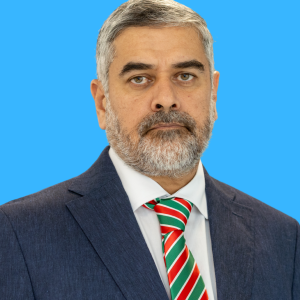Minister of State for Environment, Climate Change and Technology, Her Excellency Khadeeja Naseem
Chair of the Subsidiary Body for Scientific and Technological Advice, Mr. Harry Vreuls and colleagues,
Distinguished guests and representatives working on climate justice around the world,
Ladies and gentlemen,
A very good afternoon to you all.
I am pleased to address you today at the closing ceremony of the workshop under the Glasgow-Sharm el-Sheikh work programme on the Global Goal on Adaptation. I am certain that the discourse during the last three days have been fruitful and constructive, and as a community of practitioners, we have better understanding and potential pathways for changing mindsets and worldviews towards transformation in adaptation, with the inclusion of indigenous peoples’ wisdom, values and knowledge and consideration of cross-cutting issues.
At the launch of the sixth Assessment Report of the Intergovernmental Panel on Climate Change (IPCC), UN Secretary General highlighted that we must speed-up efforts to deliver climate justice to those on the frontlines of many crises including loss and damage that none of them have caused. In doing so he highlighted 6 clear points on what can and must be done starting this year. These are:
- Safeguarding the most vulnerable communities, and scaling up finance and capacities for adaptation and loss and damage
- Promoting reforms to ensure Multilateral Development Banks provide more grants and concessional loans and fully mobilize private finance
- Delivering on the financial commitments made in Copenhagen, Paris and Glasgow.
- Replenishing the Green Climate Fund this year and developing a roadmap to double adaptation finance before 2025.
- Protecting everyone from early warning systems against natural disasters in four years
- Implementing the new Loss and Damage Fund this year at the COP28
The workshop we are concluding today marks a very significant milestone in implementation of the above roadmap by the UN Secretary General. According to the IPCC report, there are multiple, feasible and effective options to reduce greenhouse gas emissions and adapt to human-caused climate change and these are available. To be effective, these choices need to be rooted in our diverse values, worldviews and knowledges, including scientific knowledge, indigenous knowledge and local knowledge. This approach will facilitate climate resilient development and allow locally appropriate, socially acceptable solutions. And it is indeed this is at the heart of the workshop we are concluding today.
Ladies and gentlemen,
This workshop comes amid a series of potentially transformative initiatives and events happening globally on the climate action agenda. In addition to UN Secretary-General’s has urgent and action-oriented priority towards ensuring that global temperate rise does not exceed 1.5 degrees, UN Member States are preparing for 28th COP on Climate Change in Egypt in November, and the UN Water Conference kicks off in New York today. It is very appropriate that we are concluding GGA discussions here in Maldives, a vulnerable Small Island Developing State, that has its own unique challenges which needs to be factored into the global commitments and action.
We recognize and encourage the Maldives to continue its exceptional leadership on the GGA discussions and overall in the global stage to generate the traction needed to make meaningful climate action a reality.
Much like a number of SIDS that have made bold commitments to scale up their Nationally Determined Contributions (NCDs) to the UNFCCC, Maldives too have escalated its ambitions through updated NCDs. The Maldives adopted a conditional emissions reduction target of 26% by 2030 compared to business as usual. The country also aspires to achieve net zero by 2030 with requisite international support while simultaneously improving the country's preparedness for possible future extreme weather events and strengthening collaboration with other island communities.
I hope that the discussions today supports the execution of Maldives’ NCD ambitions and those countries present in this room and connecting virtually. There are roles and responsibilities for all of us, some to take the policy decisions, some for implementing action with others to receive the needed support and manage changes. Indeed, transformational changes are more likely to succeed with trust, collaborative and prioritised risk reduction and equitable sharing of benefits and burdens.
Finally, I take this opportunity to reiterate the UN’s commitment to all efforts towards climate action and achieving climate justice that will lead to a happier, more sustainable, and peaceful future that benefits everyone around the world.
Thank You



